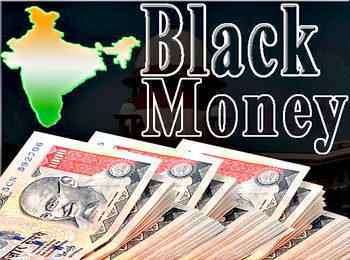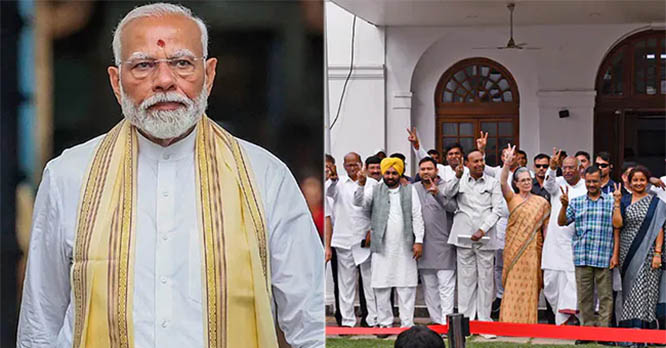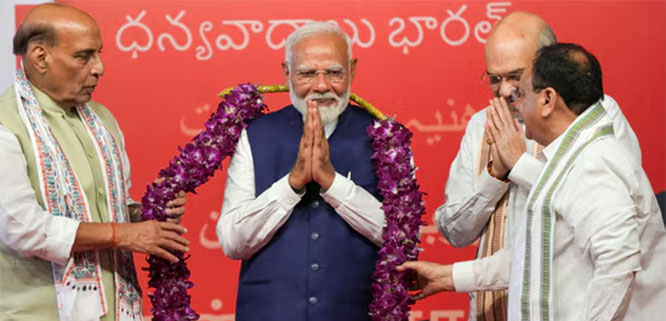New Delhi: The BJP-led NDA was ahead with leads in 296 seats and the opposition I.N.D.I.A. bloc not far behind in 227 seats as votes were counted for the Lok Sabha elections on Tuesday, setting the course for a third consecutive term as prime minister for Narendra Modi but with a stronger opposition.
While the BJP was ahead in 236 of 542 seats, the Congress had leads in 97, signaling a dip for the ruling party from the 303 score in 2019 and a spike for the opposition party’s 52 from the last election. An election marked by acridity and acrimony could end with the treasury benches in reduced numbers and an opposition with more teeth.
In trends available till 11:45 am, the NDA was close to the 300 mark, comfortably over the magic figure of 272 with the opposition I.N.D.I.A. bloc making significant gains.
The country’s most politically significant state Uttar Pradesh, which sends 80 MPs to the Lok Sabha, and the BJP’s bastion of power was poised to be the game changer, bringing the ruling NDA down from the promise of ‘400 par’ with which Election 2024 had started.
While the BJP was ahead in 36 seats, down from 62 the last time, the Samajwadi Party was tantalisingly close at 33, a far cry from the five in 2019. The Congress, which had bagged just one seat in the last election, could win eight seats this time, according to trends available on the Election Commission website.
Prime Minister Narendra Modi, who is set to equal Jawaharlal Nehru’s record of being prime minister for a third term, was trailing behind his Congress rival Ajay Rai in Varanasi in the initial rounds but gained soon after.
His party colleague Smriti Irani was trailing behind Congress candidate and the relatively unknown Gandhi family aide Kishori Lal Sharma in Amethi by more than 39,000 votes. Among those leading from the state, where Yogi Adityanath had steered the Hindutva ship for his party, were Rahul Gandhi from Rae Bareli, Rajnath Singh from Lucknow and Akhilesh Yadav from Kannauj.
As SP chief Akhilesh Yadav kept the I.N.D.I.A. bloc morale high in Uttar Pradesh, the Trinamool Congress, another key ally of the opposition alliance, was leading in 29 seats in West Bengal, a tad higher than its 22 in 2019. The BJP, which had 18 seats in the last Lok Sabha election, was ahead in 10 seats.
In neighbouring Bihar, the BJP was ahead in 11 and its partner JD-U in 14, a vote of confidence for its leader Nitish Kumar who swung from INDIA back to the NDA ahead of the elections. The RJD was poised to win five seats.
Maharashtra, with 48 Lok Sabha seats, saw the Shiv Sena split down the middle since the last election. The BJP, which won 23 seats five years ago, was down with leads in 11 seats, while its ally Shiv Sena could get six. On the other end of the spectrum, the Congress was ahead in 11 seats, up from one, and the Shiv Sena (UBT) in 11.
In Andhra Pradesh, the Chandrababu Naidu-led TDP was ahead in 16 seats of 25, the BJP in three and the YSRCP in four.
Trends for Karnataka showed potential gains for the Congress, with leads in seven seats, up from one last time. The BJP, which got 25 seats in 2019, was ahead in 19.
Deeper south in Kerala, the BJP could make its much-debated electoral entry with trends showing it could bag two seats. In parallel, the Congress, which got 15 seats last time, was ahead in 13, including in Wayanad from where Rahul Gandhi was contesting. The CPI-M had gains in one.
Tamil Nadu seemed to be scripting another story, not ceding any space to the saffron party. The ruling DMK was ahead in 20 and the Congress in eight, exactly where they were in 2019.
Assembly elections also wrote their own narrative.
In Odisha, Naveen Patnaik-led BJD was headed for an unexpected defeat, stymieing Patnaik’s bid for a record sixth term as chief minister. The BJP established early leads in at least 50 assembly seats in Odisha. The BJD nominees, on the other hand, were leading in 35 constituencies in 94 of 147 assembly seats in the state for which trends were available.
In Andhra Pradesh, Chandrababu Naidu’s Telugu Desam Party raced towards power with leads in 125 seats in the house of 175, poised to dislodge Y S Jagan Reddy’s YSRCP, which was ahead only in 21 seats.
As the results came in, showing reverses for the BJP and a score far less than it had predicted, BJP MP Tejasvi Surya said, “It is a historic day for the country in many respects. Perhaps there is no parallel in the world in any democratic country where a democratically elected leader of the nation has been consecutively elected for the third time and with an equal or bigger manner than the preceding two times.”
Congress leader Salman Khurshid added, 'I am not saying we have won, I am not saying they have lost. But this is a clear message about facts on the ground.'
According to Shiv Sena (UBT) MP Sanjay Raut, the I.N.D.I.A. alliance had surpassed the numbers predicted by the exit polls and claimed the opposition bloc will win 295 Lok Sabha seats.









Comments
Add new comment